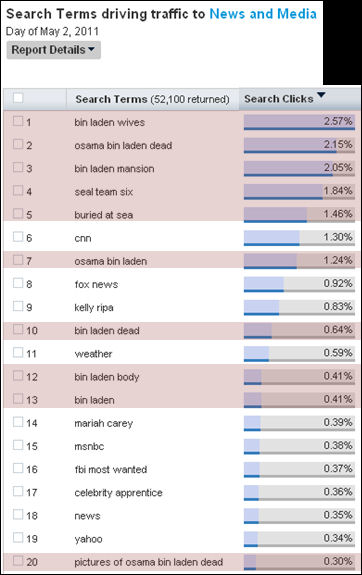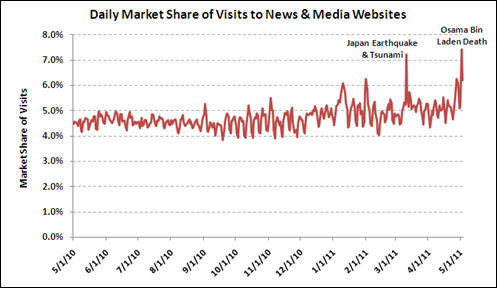No such thing as bad traffic?
US Special Forces found and killed public enemy number one Osama Bin Laden at the start of the week, but then you probably knew that already. Not only was this very big news in its own right, but also SEO gold.
In case you're not already aware of it, SEO stands for Search Engine Optimisation - the practice of increasing the possibility of people finding content via search engines, and thus increasing traffic. Traffic is the primary commodity online media has to offer advertisers in exchange for money which, as we know, makes the world go round.
SEO is now a massive industry, with many individuals and companies making a living by claiming to be good at it. But at its core, anyone can do SEO; just stick a word or phrase in your headline that you think people are likely to search for and you're almost certain to increase your traffic. In tech writing, for example, you can usually count on healthy traffic for any story with Apple in the headline.
Now there's nothing wrong with careful headline writing; an art that had been in existence long before the web was just a glint in Tim Berners-Lee's eye. But there's a difference between skilful headlines and SEO. The former aims to create a compelling statement that will entice people to read the rest of the story, or buy the newspaper. The principal aim of SEO headlines is to get the story a prominent listing on search engines.
Again if, like this article, the use of an SEO term in the headline is justified by the body copy, that's all fine. But under the relentless pressure to increase traffic as efficiently as possible, there's a trend towards the gratuitous insertion of SEO keywords that bear little, if any relevance to the rest of the story, which itself can be as short as one paragraph.
Usually the best SEO keywords revolve around the celebrity du jour, such as Lady Gaga or Justin Bieber, but according to Hitwise US, Bin Laden was the magic keyword as soon as news of his death broke. Furthermore, visits to news sites hit a three year high. The most SEO-savvy sites wasted little time in ensuring they capitalised on this massive public interest.


But there are dangers in pursuing an SEO-centric strategy. First and foremost, you never know when Google is going to move the goalposts and render your strategy obsolete. And where there's online opportunism, there will always be bad guys, and nobody is as quick to exploit new ways of conning people into clicking on links than cyber-criminals.
Over the course of this week we've received several press releases from security companies warning of the many ways criminals and hackers were looking to exploit this new golden keyword. They range from the relatively benign, such as Imperva's advisory on how this event is being used to generate instant Facebook communities (Imperva provided the screenshot from an SEO forum below), to the hacking of the Twitter account of some chap who witnessed the operation, and just good old malware links disguised as news information.

"We've seen this sort of thing as recently as the Japanese Tsunami, along with localised events such as interest surrounding the royal wedding," said Claus Villumsen of Bullguard. "It's an opportunist attack by hackers who hope that a person's curiosity will get the better of them and follow requests that are posted on screen in order to view an image or video. Unfortunately this often involves installing a file that could contain malware or circulating spam only to be directed to an irrelevant site."
Some tech journalists, ourselves included, are also uneasy about the effect SEO is having on our profession. As well as the frankly self-defeating proclamations from many commentators about how much quicker and better it was to get the news via ‘citizen journalists' on Twitter than professional media (which we remain unconvinced about), there's the dilution of quality reporting and analysis online by the deluge of SEO spam.
MG Siegler, a TechCrunch writer, held forth on the matter on his own blog earlier this week. "This is the state of tech blogging these days," he lamented. "It's shifting more towards a mixture of quick-posted nonsense and pure SEO plays...Welcome to the sad state of our industry. CONGRATS."
Professional journalists can only hope that a combination of search algorithm changes, consumer backlash at being deceived into clicking on low-value content, and greater qualitative evaluation by advertisers will ensure it's still possible to make a living out of writing quality content. The alternative is bleak for writers and readers alike.













